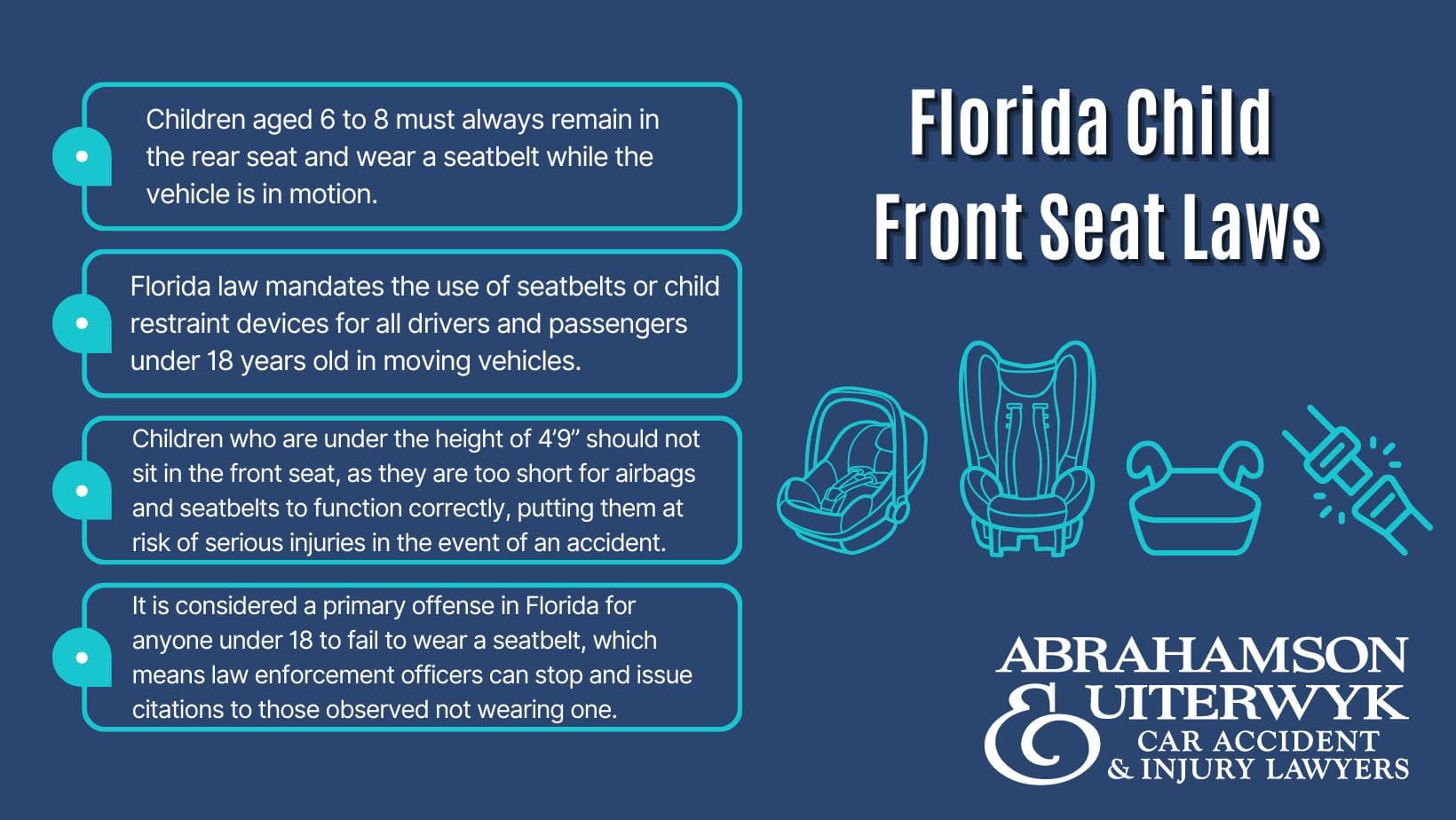Child Seat Laws In Florida – When Can Kids Sit In The Front Seat?
No matter how exciting it is to sit in the front seat as a child, adhering to child car seat laws in Florida is of utmost importance, considering the serious risks and consequences involved. Statistics from the National Highway Traffic Safety Administration reveal that in 2019 alone, approximately 189,000 children were injured in motor vehicle accidents nationwide, with over 1,050 of these accidents leading to the tragic death of a child. Shockingly, car accidents are the leading cause of death among children under the age of 14.
Child safety seats play a critical role in protecting young passengers. Seat belts alone are not enough to ensure their safety, as they may not adequately protect children who are either too short or too light in weight. Properly used child seats can significantly reduce the risk of death or injury in an accident, with potential risk reductions of up to 71% for infants and up to 54% for toddlers. For children between the ages of 4 and 12, wearing a seatbelt can increase their chances of surviving a motor vehicle accident by more than 45%.
Given these compelling statistics, it is crucial for parents, grandparents, babysitters, and anyone else responsible for transporting children to fully understand and comply with child car seat laws in Florida. We understand that every child looks forward to the day they can finally sit in the front seat, however not adhering to Florida child car seat laws can be a devastating choice. By adhering to child car seat laws, we can take significant steps towards ensuring the safety and well-being of our young passengers during every journey on the road.
Wondering when can kids sit in the front seat in Florida? 13 years old is the recommended age when a child can sit in the front seat, according to many car manufacturers, even though Florida law doesn’t specifically mandate children to sit in the back seat.
Front Seat Requirements In Florida
The safety of children while riding in a car is paramount, and there are specific age restrictions to consider when it comes to sitting in the front seat. According to Florida Highway Safety & Motor Vehicles, children should remain in the rear seats until they reach at least 13 years old, as the deployment of front seat airbags can be hazardous for younger passengers. While Florida law doesn’t explicitly require children to ride in the back seat, many car manufacturers advise against allowing kids to sit in the front until they reach 13 years of age.
It’s essential to be aware of the front seat requirements and age restrictions that apply to ensure the safety of young passengers, including the following:
- Children aged 6 to 8 must always remain in the rear seat and wear a seatbelt while the vehicle is in motion.
- Florida law mandates the use of seatbelts or child restraint devices for all drivers and passengers under 18 years old in moving vehicles. It is considered a primary offense in Florida for anyone under 18 to fail to wear a seatbelt, which means law enforcement officers can stop and issue citations to those observed not wearing one.
How Tall Do You Have to Be to Sit In the Front Seat?
To understand more about age limits for children sitting in the front seat, drivers can refer to the Florida Driver’s License Handbook for comprehensive information. Front seat requirements in Florida apply to all passengers, not just children. Everyone sitting in the front driver or passenger seat must wear a seatbelt, regardless of their age.
Furthermore, children who are under the height of 4’9” should not sit in the front seat, as they are too short for airbags and seatbelts to function correctly, putting them at risk of serious injuries in the event of an accident. According to the American Academy of Pediatrics, children should be both at least 4’9” in height and at least 13 years old to sit in the front seat safely. This also addresses common questions such as “how tall do you have to be to sit in the front seat” and “how old do you have to be to sit in the front seat in Florida.”
Ensuring compliance with these guidelines will help safeguard the well-being of young passengers and protect them from potential harm while traveling in a vehicle.

Additional Child Seat Laws In Florida
In Florida, child car seat laws have specific requirements that must be followed to ensure the safety of young passengers, including the following:
- Children under the age of 5 years old are required to be secured in child safety seats that have been crash-tested and federally approved.
- Children between the ages of four and five may use a separate child carrier, an integrated child seat, or a booster seat for proper restraint.
- Children aged 0 to 3 must be restrained by a child restraint device, which can be either a separate carrier or an integrated child seat provided by the vehicle manufacturer.
It is important to note that the use of recalled child seats, booster seats, or carriers to secure a child in a vehicle is strictly prohibited.
The proper fitting of the child safety seat to both the child and the vehicle is crucial when using a motor vehicle. Children who are 4’9″ and taller are allowed to transition to a car seat or booster seat under Florida law, with the exception of those who are under the age of 5.
For more comprehensive information about child safety seats, parents can refer to the Florida Driver’s License Handbook, which provides additional guidelines and essential details on adhering to child car seat laws in the state. Following these regulations is vital to ensuring the well-being and protection of young passengers while traveling in vehicles throughout Florida.
Why You Shouldn’t Allow Your Child To Ride In The Front Seat Until They Are Old Enough
Allowing children to sit in the front seat of a vehicle before they are old enough and meet the necessary safety requirements should be avoided for several compelling reasons.
Airbags Are Dangerous To Children
Airbags, designed to protect adults during crashes, can pose a significant danger to young passengers due to their size and weight. Airbag injuries to the face can be particularly severe for children in the front seat, as they are more vulnerable to injury or even fatalities if an airbag deploys during an accident. To minimize this risk, it is crucial to adhere to the age and height recommended by manufacturers and Florida Highway Safety And Motor Vehicles, ensuring that children are of an appropriate size and age before permitting them to occupy the front seat.
The Front Seat Is Not Designed For Children
The front seat is not designed for children to ride in. In fact, child safety seats and the backseat areas of vehicles are meticulously designed to offer maximum protection to young passengers, considering their physical development and specific needs. The front seat lacks the essential anchoring points and specialized features typically present in the backseat, making it unsuitable for securely fastening child seat devices.
By following child car seat laws and using federally approved child safety seats in the rear seats, parents can significantly reduce the likelihood of injury or harm to their children in the event of an accident. Prioritizing their safety above all else, parents should patiently wait until their children reach the appropriate age and size to sit in the front seat, ensuring a safer and more secure travel experience for their precious little ones.
Has Your Child Been Injured In A Car Accident? Contact A Florida Personal Injury Attorney Near You
If your child has suffered injuries in a car accident within the state of Florida, regardless of the cause – be it product liability, negligence of another driver, or improperly secured child restraints – it is vital to seek immediate legal assistance. Your child’s well-being is of utmost importance, and at Abrahamson & Uiterwyk, our experienced personal injury attorneys are here to offer their help and support. With an in-depth understanding of Florida’s personal injury laws and a commitment to safeguarding the rights of injured children, our team will advocate fiercely on your behalf. By reaching out to Abrahamson & Uiterwyk, you can be confident that a compassionate and experienced legal team stands beside you, dedicated to pursuing the rightful compensation your child deserves and providing guidance throughout this challenging time. Your child’s health and future are our priority, so don’t hesitate to contact the nearby car accident lawyers at Abrahamson & Uiterwyk for expert legal representation and the pursuit of justice.

